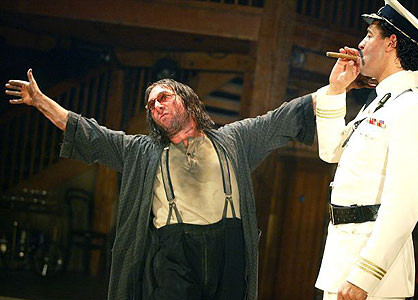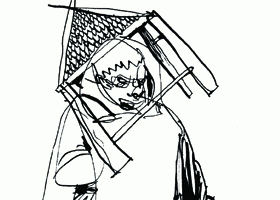I had less time for reading this year than I would have liked. When I selected Drago Jancar’s haunting and beautiful The Tree with No Name for Slate’s Overlooked Books, it was still with the knowledge that I’d read a lot less fiction than I’d wanted. And Antal Szerb’s excellent, though modest Journey by Moonlight is a bit of a cheat, since I read it (and wrote about it) when Pushkin Press published it all the way back in 2003, rather than when NYRB Classics reissued it this year. It’s stayed with me, though, so I can pick it with more certainty than some of the other choices.
Seeing Richard McGuire’s long-gestating Here finally be published bookends my reading the original 8 page version in RAW when I was 13, when it changed my life. I wrote about the original Here in 2003 too.
And Alonso de Ercilla’s 1569 Spanish-Chilean epic The Araucaniad has been an alluring title to me since I read about it in David Quint’s fascinating Epic and Empire in connection with Lucan’s Civil War. Quint described The Araucaniad as one of those rare epics that takes the side of the losers, and it’s one of those artifacts, like Lucan’s Civil War, that doesn’t fit neatly with any common sense of literary history. Its relevance stems from its own grim variation on a theme that is at the heart of so many great epics and books: in Quint’s words, “that those who have been victimized losers in history somehow have the right to become victimizing winners, in turn.” It deserves a new translation.
As with last year, I haven’t read the entirety of some of the nonfiction selections: Chris Wickham is an excellent historian but I’m not going to deny that some of his Annales-ish wonkery had my eyes skimming. And while the biology and physics books are pretty interesting, I can’t say with much certainty that they’re accurate.
If anyone’s curious as to why some book or other made the list, feel free to ask in the comments. Thanks again for reading my work here or elsewhere.
(As always, I do not make any money from these links; they’re just the easiest way to get the thumbnails.)
Literature
The Araucaniad: A Version in English Poetry of Alonso de Ercilla y Zuniga's La Araucana
Price: $19.99
1 used & new available from $19.99
Contemporaries and Snobs (Modern and Contemporary Poetics)
Price: $33.20
1 used & new available from $33.20
A Voice Full of Cities: The Collected Essays of Robert Kelly
Price: $37.20
18 used & new available from $25.75
In the Heart of the Heart of the Country: And Other Stories (NYRB Classics)
Price: $15.95
33 used & new available from $11.00
Nonfiction
Time, History, and Literature: Selected Essays of Erich Auerbach
Price: $46.23
8 used & new available from $12.47
Plato and the Post-Socratic Dialogue: The Return to the Philosophy of Nature
Price: $101.00
8 used & new available from $63.98
We Are Our Brains: A Neurobiography of the Brain, from the Womb to Alzheimer's
Price: $30.00
34 used & new available from $4.50
Inside Paradise Lost: Reading the Designs of Milton's Epic
Price: $35.00
20 used & new available from $25.98
Consciousness and the Brain: Deciphering How the Brain Codes Our Thoughts
Price: $38.49
25 used & new available from $5.84
Dictionary of Untranslatables: A Philosophical Lexicon (Translation/Transnation Book 35)
Price: $52.57
1 used & new available from $52.57
Price: $42.20
15 used & new available from $36.10
Plato at the Googleplex: Why Philosophy Won't Go Away
Price: $16.64
61 used & new available from $2.08
Religio Duplex: How the Enlightenment Reinvented Egyptian Religion
Price: $21.00
1 used & new available from $21.00
Price: $60.00
11 used & new available from $47.40
The Invention of News: How the World Came to Know About Itself
Price: $30.46
27 used & new available from $3.01
Japan and the Shackles of the Past (What Everyone Needs to Know (Hardcover))
Price: $17.36
34 used & new available from $7.29
Discrete or Continuous?: The Quest for Fundamental Length in Modern Physics
Price: $114.42
11 used & new available from $38.96
On the Run: Fugitive Life in an American City (Fieldwork Encounters and Discoveries)
Price: $18.90
64 used & new available from $4.43
Price: $16.93
86 used & new available from $1.75
Science and Emotions after 1945: A Transatlantic Perspective
Price: $120.00
2 used & new available from $86.40
Cataloging the World: Paul Otlet and the Birth of the Information Age
Price: $24.89
28 used & new available from $4.06
Price: $22.79
27 used & new available from $17.66
The New Arabs: How the Millennial Generation is Changing the Middle East
Price: $9.00
22 used & new available from $5.00
Experience and History: Phenomenological Perspectives on the Historical World
Price: $107.26
12 used & new available from $98.07
Price: $81.98
8 used & new available from $20.50
Arrival of the Fittest: Solving Evolution's Greatest Puzzle
Price: $12.50
34 used & new available from $3.17
Hacker, Hoaxer, Whistleblower, Spy: The Many Faces of Anonymous
Price: $14.98
39 used & new available from $2.43
Becoming Mead: The Social Process of Academic Knowledge
Price: $38.00
9 used & new available from $29.50
The Congress of Vienna: Power and Politics after Napoleon
Price: $56.00
19 used & new available from $12.56
Children into Swans: Fairy Tales and the Pagan Imagination
Price: $26.06
8 used & new available from $13.99
Earth's Deep History: How It Was Discovered and Why It Matters
Price: $45.00
16 used & new available from $6.99
Forensic Shakespeare (Clarendon Lectures in English)
Price: $31.78
16 used & new available from $26.88
The Computing Universe: A Journey through a Revolution
Price: $94.99
8 used & new available from $44.38
Price: $77.00
18 used & new available from $33.60
The Invention of Improvement: Information and Material Progress in Seventeenth-Century England
Price: $73.40
12 used & new available from $57.70
The Black Box Society: The Secret Algorithms That Control Money and Information
Price: $40.01
21 used & new available from $6.48
Self and Other: Exploring Subjectivity, Empathy, and Shame
Price: $80.74
14 used & new available from $56.42
In Other Shoes: Music, Metaphor, Empathy, Existence
Price: $165.05
6 used & new available from $142.98
Price: $60.00
8 used & new available from $57.00
Philology: The Forgotten Origins of the Modern Humanities (The William G. Bowen Series)
Price: $73.98
10 used & new available from $58.06
Comics
Price: $23.26
46 used & new available from $21.00
Perfect Nonsense: Chaotic Comics and Goofy Games of George Carlson
Price: $45.99
14 used & new available from $20.72














































